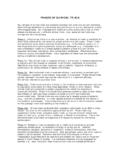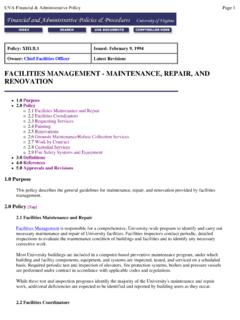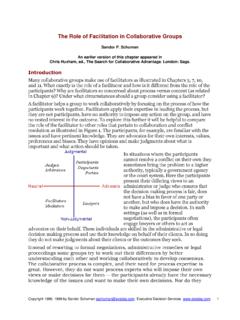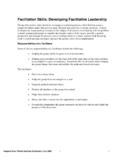Transcription of THE ROLE OF THE FACILITATOR - The University of …
1 THE ROLE OF THE FACILITATOR What is a Meeting FACILITATOR ? The FACILITATOR is a guide or discussion leader for the group. The process of facilitation is a way of providing leadership without taking the reigns. A FACILITATOR s job is to get others to assume responsibility and take the lead. Some common definitions include: A person who is acceptable to all group members, substantively neutral, and has no decision-making authority who helps a group improve the way it identifies and solves problems and makes decisions. - adapted from Roger M. Schwarz One who contributes structure and process to interactions so groups are able to function effectively and make high-quality decisions.
2 A helper and enabler whose goal is to support others as they achieve exceptional performance. - Ingrid Bens What Does a Meeting FACILITATOR Focus On? A facilitative leader focuses on both content and process. They are the content and process leader. Content = What tasks, subjects, problems are being addressed Process = How things are discussed, including: Methods Procedures Format Tools Style of interaction Group norms Group dynamics Group climate The Two Types of FACILITATOR roles Process FACILITATOR Content FACILITATOR How What The methods and procedures How relations are maintained The tools being used The rules or norms set The group dynamics The climate The subjects for discussion The task The problem being solved The decisions being made The agenda items The goals The Content FACILITATOR as Facilitative Leader The type of leader innovative organizations need is one who works from a set of core
3 Values consistent with the concepts of empowerment, commitment, collaboration, learning and partnership. This type of FACILITATOR use core values and principles that underlie the role of FACILITATOR and provide a foundation for becoming a facilitative leader. A process FACILITATOR and a facilitative leader use the same core values and principles, but apply them in different ways consistent with their roles . Many facilitative leaders are in fact people leading implementation teams or directing and managing their own business units. Hence, the have more authority to make decisions for their group while serving as FACILITATOR during meetings or planning sessions.
4 Differences between Facilitators and Facilitative Leaders Characteristics FACILITATOR (Process) Facilitative Leaders (Content) Group Membership Third Party Leader of group Involvement in substantive issues Substantively neutral Deeply involved in issues Use of expertise Process expert Content and process expert Decision making authority No Yes Core Values of Facilitation Applied to Leadership Valid Information Facilitative leaders share all relevant information with group members ( , about strategy, financing, and salaries). Facilitative leaders share the reasons for their actions and statements.
5 They encourage other to disagree with them. Ultimately all issues are open to discussion. Free and Informed Choice Facilitative leaders understand that while external controls generate compliance, internal controls generate commitment. Consequently, they seek to increase the extent to which group members make their own choices about their work. Internal Commitment This is a neutral result of valid information and free and informed choice. Serving Everyone s Interests and Thinking Systematically Facilitative leaders help other to focus on the interests of all stakeholders when crafting solutions.
6 They understand that to remain effective, groups must maintain their ability to work together and meet members personal needs (as appropriate), as well as deliver quality services or products. They shift from focusing on placing blame to focusing on understanding how problems arise and how they continue despite the sincere efforts of many people to solve them. Increasing Responsibility and Ownership and Reducing Dependence The facilitative leader seeks to do for the group that which it can not yet do for itself. He/she recognizes that the systematic solution lies in helping the group address the root causes of its ineffective behavior, thereby increasing the group s ability to deal with similar problems in the future.
7 Creating Conditions for Learning Learning is when members identify the core values and beliefs that guide their behavior, understand how some values and beliefs undermine their effectiveness, and learn how to act consistently with a more effective set of values and beliefs. Facilitative leaders share the core values, principles, and ground rules with others, discuss what they mean and ask for feedback as to how they use them. They model the values so that others can make informed choices about whether to embrace them themselves. FACILITATOR Competencies The FACILITATOR is effective in using core methods (distinguishes process from content) The FACILITATOR carefully manages the client relationship and prepares thoroughly (scoping)
8 The FACILITATOR uses time and space intentionally The FACILITATOR is skillful in evoking participation and creativity The FACILITATOR is practiced in honoring the group and affirming its wisdom The FACILITATOR is capable of maintaining objectivity The FACILITATOR is skilled in reading the underlying dynamics of the group The FACILITATOR orchestrates the event drama The FACILITATOR releases blocks to the process The FACILITATOR is adroit in adapting to the changing situation The FACILITATOR assumes responsibility for the group journey The FACILITATOR can produce powerful documentation The FACILITATOR demonstrates professionalism, self-confidence, and authenticity The FACILITATOR maintains personal integrity Characteristics of the FACILITATOR One who is willing to commit to a style of: "asking" rather than "telling.
9 " paying personal compliments willing to spend time in building relationships rather than being always task-oriented initiating conversation rather than waiting for someone else to asking for other's opinions rather than always having to offer their own negotiating rather than dictating decision-making listening without interrupting emoting but able to be restrained when the situation requires it drawing energy from outside themselves rather than from within basing decisions upon intuitions rather than having to have facts has sufficient self-confidence that they can look someone in the eye when talking to them more persuasive than sequential more enthusiastic than systematic more outgoing than serious more like a coach than a scientist more like a counselor than a sergeant is naturally curious about people, things and life in general can keep the big picture in mind while working on the nitty-gritty Facilitation Tools.
10 Exercises, Simulations, Diagnostics Facilitation tools are the gimmicks, instruments, exercises, and tricks which facilitators employ to stimulate activity, illustrate a point, provide feedback, perform analysis, keep the participants on track and focused, and handle the unexpected. An experienced FACILITATOR will have literally hundreds of tools in his/her toolkit . Types of facilitation tools include: Ice breakers, energizers, and closers Experiential learning exercises for team building, goal setting communication, problem solving, paradigm shifts, decision making, diversity issues, etc.
















